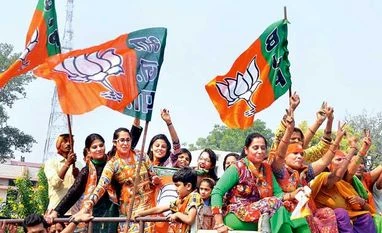The BJP constitution, as posted on its website, states: “National executive shall consist of president and not more than 120 members, of whom at least 40 shall be women and 12 shall be SC/ST (scheduled caste and scheduled tribe) to be nominated by the president.” The BJP is the only mainstream party to explicitly reserve one-third of its seats for women in its party structures, but party leaders say this is more a goal that the party aspires to reach rather than something that can be strictly conformed to give the paucity of women in public life.
The previous national executive also didn’t meet this one-third principle but had many more women than the new one. The party dropped as many as 16 women such as Najma Heptulla and Smriti Irani from the list. Party leaders refused to comment on the issue, but pointed out that the party constitution empowers the president to use his “discretion” in nominating members to the national executive. A party leader said the anomaly will be addressed when vacancies are filled.
There is little clarity on why Irani, made a Cabinet minister despite Rashtriya Swayamsevak Sangh (RSS) having reservations, has been excluded. Sources close to Heptulla say she is not upset as the party has made her a Cabinet minister and that she has been in the national executive for nearly a decade, and now new people should get an opportunity. Minister of State for Parliamentary Affairs Mukhtar Abbas Naqvi is the only Muslim face in the list.
Irani and Heptulla aside, prominent among those dropped are Mathura MP Hema Malini, Maharashtra youth leader Shaina NC, UP’s Kusum Rai, MP’s Maya Singh, Poonam Azad and lawyer Pinky Anand.
The eight women are External Affairs Minister Sushma Swaraj, former Delhi mayor Arati Mehra, Jharkhand minister Louis Marandi, Kerala leader Shobha Surendran, former MP from Delhi Anita Arya, Women and Child Development Minister Maneka Gandhi and Gauri Chaudhary. Those like Rajasthan CM Vasundhara Raje, Gujarat CM Anandiben Patel and Water Resources Minister Uma Bharati, a former Madhya Pradesh CM, are in the 27 member list of permanent invitees that includes all chief ministers and former chief ministers.
Two others, Kirron Kher and Sadhvi Niranjan Jyoti, both MPs, are the only women in the 40-member list of ‘special invitees’. In all, there are 13 women among a total of 178 National Executive members and invitees - a mere 7.3 per cent.
But the BJP isn’t alone in giving women poor representation in its party structures. The Aam Aadmi Party’s Delhi government has no woman minister, while its 25-member national executive has only one woman.
Brinda Karat is the lone woman in CPI(M)’s 15-member politburo and its 74-member central committee has 11 women. The Congress has a woman as its president but including Sonia Gandhi herself the party has only five women in its 37-member Congress Working Committee.
)